Front Cover
[The covers are cut from a contemporary newspaper.]
Inside Front Cover
Page i
Page ii
Page 1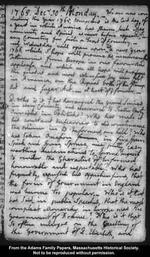
1765.DECR. 30TH. MONDAY.
We are now concluding the Year 1765, tomorrow is the last day, of a Year in which America has shewn such Magnanimity and Spirit, as never before appeared, in any Country for such a Tract of Country. And Wednesday will open upon Us a new Year 1766, which I hope will procure Us, innumerable Testimonies from Europe in our favour and Applause, and which we all hope will produce the greatest and most extensive joy ever felt in America, on the Repeal both of the stamp Act and sugar Act, at least of the former.
[Query]. Who is it, that has
harrangued the Grand juries in every County, and endeavoured to scatter Party Principles in
Politicks? Who has made it his constant Endeavour to discountenance the Odium in which Informers are held? Who has taken Occasion
[illegible] in fine spun,
spick and span, spruce, nice, pretty, easy warbling Declamations to Grand Inquests to render the Characters of Informers,
honourable and respectable? Who has frequently expressed his Apprehensions, that the form of Government in England was become too popular. Who is it, that has said in public Speeches, that the most
compleat Monarchy in Europe was the Government of France? Who is it, that so often enlarges on the Excellency of the Government of Queen Elizabeth, and
Page 2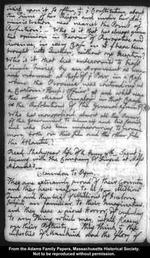
insists upon it so often, that the Constitution, about the Time of her Reign and under her Administration, was nearest the Point of Perfection? Who is it that has always given his opinion in
Favour of Prerogative and Revenue, in every Case in which they have been brought into Question, without one Exception? Who is it that has endeavoured to
biass simple juries, by an Argument as warm and vehement, as those of the Bar, in a Case where the Province was contending
vs. a Custom -- House -- Officer? And what were the other Means employed in that Cause
vs. the Resolutions of the General Assembly? Who has monopolized almost all the Power, of the Government, to himself and his family, and who has been endeavouring to procure more, both on this side and the other side the Atlantic?
Read Shakespears Life of K. Henry 8th. Spent the Evening with the Company of Singers at Moses Adams's.
Clarendon to Pym.
They are
extreamly proud of their Country, and they have reason to be so. Millions, Tens and Hundreds of Millions of Freeborn Subjects, are familiar to their Imaginations, and they have a pious Horror, of consenting to
any Thing, which may
intail slavery on their Posterity. They think that the Liberties of Mankind and the Glory of
Page 3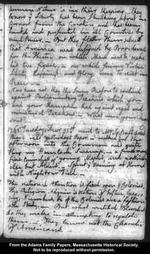
human Nature is in their Keeping. They know that Liberty has been skulking about in Corners from the Creation, and has been hunted and persecuted, in all Countries, by cruel Power. But they flatter
them selves that America was designed by Providence for the Theatre, on which Man was to make his true figure, on which science, Virtue, Liberty, Happiness and Glory were to exist in Peace.
Now have not they the same Reason to contend against Parliamentary Taxations, which you and your Hampden had against regal and ministerial Taxations. -- What were your Reasons?
1765. TUESDAY. DECR. 31ST.
Went to Mr. Jo. Bass's and there read Yesterdays Paper. Walked in the Afternoon into the Common and quite thro my Hemlock Swamp. [I] find many fine Bunches of young Maples, and nothing else but Alders. Spent the Evening at Home with Neighbour Field.
The national Attention is fixed upon the Colonies. The Religion, Administration of Justice, Geography, Numbers, &c. of the Colonies are a fashionable Study. But what wretched Blunders do they make in attempting to regulate them. They know not the Character of Americans.
Page 4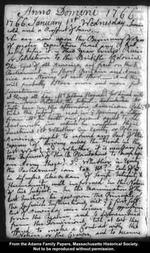
ANNO DOMINI 1766
1766. JANUARY 1 ST. WEDNESDAY.
Severe cold, and a Prospect of Snow.
We are now upon the Beginning of a Year of greater Expectation than any, that has passed before it. This Year brings Ruin or Salvation to the British Colonies. The Eyes of all America, are fixed on the [British ]Parliament. In short Britain and America are staring at each other. -- And they will probably stare more and more for sometime.
At Home all day. Mr. Joshua Hayward Jur. dined with me. Town
Politicks, the Subject.
Drank Tea Dr. Tufts here in the Afternoon, American
Politicks the Subject. Read, in the Evening a Letter from
Mr. Duberdt our present Agent to Ld. Dartmouth, in which he considers three Questions. 1st. Whether in Equity or Policy America ought to refund any Part of the
Expence of driving away the French in the last War? 2d. Whether it is necessary for the
Defence of the
[British] Plantations, to keep up an Army there? 3d. Whether, in Equity, the Parliament can tax Us? Each of which he discusses like a Man of Sense, Integrity and Humanity, well informed in the Nature of his Subject. In his Examination of the last Question he goes upon the Principle of the Ipswich Instructions, vizt. that the first Settlers of America, were driven by Oppression from the Realm, and so dismembered from the Dominions, till at last they offered to make a Contract with the Nation, or the Crown, and to become
Page 5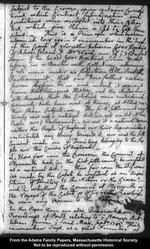
subject to the Crown upon certain Conditions, which Contract, Subordination and Conditions were wrought into their Charters, which give them a Right to tax themselves. This is a Principle which has been advanced long ago. I remember in the
Tryal of the Cause at Worcester between Governor Hopkins of Rhode Island and Mr. Ward one of the Witnesses swore that he heard Governor Hopkins, some Years before, in a Banter with
Coll. Amy, advancing that We were under no subjection to the British Parliament, that our Forefathers came from Leyden &c. -- and indeed it appears from Hutchinsons History, and the Massachusetts Records, that the Colonies were considered formerly both here and at Home, as Allies rather than Subjects. The first Settlement certainly was not a national Act, i.e. not an Act of the People nor the Parliament. Nor was it a national
Expence. Neither the People of England, nor their Representatives contributed
any thing towards it. Nor was the Settlement made on a Territory belonging to the People nor the Crown of England.
[Query]. How far can the Concern the Council at Plymouth had, in the first Settlement, be considered as a national Act? How far can the Discoveries made by the Cabots, be considered as an Acquisition of Territory to the Nation or the Crown? -- and Q. whether the Council at Plymouth or the Voyages of the Cabots, or of Sir Walter Rawleigh &c. were any Expence to the Nation?
In the Paper there are also, Remarks on the Proceedings of Parliament relating to the stamp Act taken from the London Magazine
Septr. 1765. This remarker says, as a great Number of
Page 6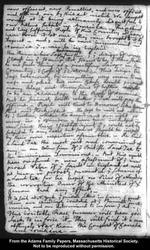
new Offences, new Penalties, and new offices and officers, are by this Act created, We cannot wonder at its being
extreamly disgustful to our Fellow Subjects in America. The patient and long suffering People of this Country would scarcely have born it at once -- they were brought to it by Degrees -- and they will be more inconvenient in America than they can be in England.
The Remarker says further, that the design of one Clause in the Stamp Act, seems to be, that there shall be no such Thing as a practising Lawyer in the Country, the Case of the Saxons. This design he says ludicrously, by compelling every man to manage and plead his own Cause, would prevent many delays and Perversions of justice, and so be an Advantage to the People of America. But he seriously doubts whether the Tax will pay the Officers. People will trust to Honour, like Gamesters and Stockjobbers. He says he will not enter into the Question, whether the Americans are right or wrong in the Opinion they have been indulged in ever since their Establishment, that they could not be subjected to any Taxes, but such as should be imposed by their own respective Assemblies. He thinks a Land Tax the most just and convenient of any -- an Extension of the British Land Tax to the American Dominions. But this would have occasioned a new Assessment of the improved Value of the Lands in England as well as here, which probably prevented the Scheme of a Land tax, for he hopes, no View of extending the corruptive Power of the Ministers of the Crown had any Effect.
It is said at N. York, that private Letters inform, the great Men are exceedingly irritated at the Tumults in America, and are determined to inforce the Act. This irritable Race, however, will have good Luck to inforce it. They will find it a more obstinate War, than the Conquest of Canada and Louisiana.
Page 7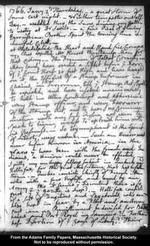
1766. JANY. 2D. THURDSDAY.
A great Storm of Snow last night. Weather tempestuous all Day. Waddled thro the Snow, driving my Cattle to water at Dr. Savils. A fine Piece of glowing Exercise. -- Brother spent the Evening here in chearful Chat.
At Phyladelphia, the Heart and Hand fire Company has expelled Mr. Hewes
[Hughes] the Stamp Man for that Colony. The Freemen of Talbot County in Maryland have erected a Jibbet before the Door of the Court House 20 feet High, and have hanged on it, the Effigies of a Stamp Informer in Chains, in Terrorem, till the Stamp Act shall be repealed, and have resolved unanimously to hold in Utter Contempt and Abhorrence every Stamp Officer, and every Favourer of the Stamp Act, and to have no Communication with any such Person, not even to speak to him, unless to upbraid him with his Baseness. -- So
tryumphant is the Spirit of Liberty,
every where. -- Such an Union was never before known in America. In the Wars that have been with the french and Indians, a Union could never be effected. -- I
pitty my unhappy fellow Subjects in Quebeck and Hallifax, for the great Misfortune that has befallen them. Quebec consists chiefly of French Men who
[are mixed] with a few English and awed by an Army-
tho it seems the Discontent there is so great that the Gazette is
drop'd. Hallifax consists of a
sett of Fugitives and Vagabonds, who are also kept in fear by a Fleet and an Army. But can no Punishment be devised for Barbadoes and Port Royal in Jamaica? For their base Desertion of the Cause of Liberty? Their
Page 8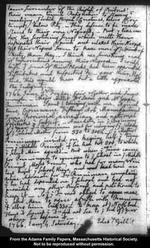
tame Surrender of the Rights of Britons? Their mean, timid Resignation to slavery? Meeching, sordid, stupid Creatures, below Contempt, below Pity. They deserve to be made Slaves to their own Negroes. But they live under the
scortching Sun, which melts them, dissipates their Spirits and relaxes their Nerves. Yet their Negroes seem to have more of the Spirit of Liberty, than they. I think we sometimes read of Insurrections among their Negroes. I could wish that some of their Blacks had been appointed Distributors and Inspectors &c. over their Masters. This would have but a little aggravated the Indignity.
1766. JANY. 3D. FRYDAY.
Fair Weather and Snow enough. Major Miller, Dr. Savil and Mr. Joseph Penniman spent the Evening, with me. Agriculture, Commerce, Fishery, Arts, Manufactures, Town, Provincial, American, and national Politicks the Subject. -- Anecdote, in the Beginning of the Year, Deacon Penniman was for reducing the Salary of the School Master from 330 to 300. The Master Penniman insisted on keeping half the time in the Middle Precinct, if he had but 300, to which the Select Men agreed. But when the Time came for Penniman to remove to the School in the Middle Precinct, Moses French, who had for many Winters kept the School there, and had been an active Advocate for Deacon Penniman, complained that he had depended on that School, and had not provided any other Business, and petitioned to keep it. So that the Deacon was obliged to [illegible] move the select Men to agree afresh with Penniman and allow him his 330 to keep at the North End. Thus it seems the Deacon did not see to the End of the Year when he began it.
1766. JANY. 4. SATURDAY.
Edes & Gill's
Page 9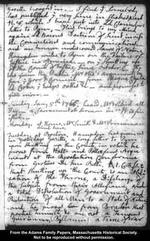
Gazette brought in. I find that Somebody has published the very scene in
Shakespears [Henry] 8, which I have put into Ld. Clarendons Letter to Pym. This brings to my Mind again Ld. Bacons Doctrine of secret, invisible Connections and communications, and unknown undiscovered Laws of Nature. Hampden writes to Pym on the Failure of Justice in America, on the shutting up of the Courts of justice, since October. He has given the Public Mr. Otis's Arguments before the Governor and Council, from Magna Charta, Ld. Coke, the Judges Oaths &c. -- and promises to give more.
SUNDAY. JANY. 5TH. 1766.
Heard Mr. Wibird all Day. A Sacramental Sermon on "It is finished. -- "
MONDAY [6 JANUARY].
At Home. Mr. Smith and Mr. Penniman dined here.
TUESDAY [7 JANUARY].
At Boston. Hampden has given us in Yesterdays Gazette, a long Letter to Pym upon shutting up the Courts, in which he proves from Holts and Pollexfens Arguments at the Revolution Conference, from Grotius De Jure Belli, B. 1. C. 3. . 2. that shutting up the Courts is an Abdication of the Throne, a Discharge of the Subjects from their Allegiance, and a total Dissolution of Government and Reduction of all Men to a state of Nature. And he proves [illegible] from Bracton that partial Tumults, &c. are not a Tempus Guerrium, (Bellorum) a Time of War.
Page 10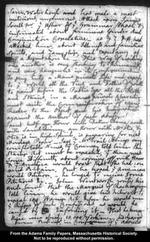
Sam. Waterhouse and has made a most malicious, ungenerous, Attack upon James Lovell Jur. the Usher of the Grammar school, and insinuated about feminine Gender and Conjunction Copulative -- as Y.Z. and H. had attacked him, about Idleness and familiar Spirits, and Zanyship, and Expectancy of a Deputation &c. This Way of reviling one another is very shocking to Humanity and very dangerous in its Consequences. To pry into a Mans private Life, and expose to the
World, all the Vices, and Follies of Youth, to paint before the Public Eye, all the Blotts and Stains, in a Mans private Character, must excite the Commisseration of every Reader, to the Object, and his Indignation against the Author of such Abuse.
Spent half an Hour with Father Dana, another with Samuel Quincy, an Hour with Mr. Otis, &c. Otis is in high Spirits, is preparing for next Mondays Paper. Says that Mr. Trail brings very comfortable News, that Conway told him the Stamp Act must be repealed, that there was some Difficulty about coming off with Honor and that America would boast that she had conquered Britain. But he hoped the Americans would Petition. He longed to receive some Petitions &c. John Wentworth writes his Uncle Saml., that the Marquis of Rockingham told him, he would give his Interest to repeal 100 stamp Acts, before he would run the
Risque of such Confusions, as would be caused by
the Enforcing it. That he knew there were already 10,000 Workmen discharged from Business, in Consequence of the Advices
Page 11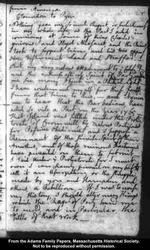
from America.
Clarendon to Pym.
Nothing gave me so much Regret, or such Remorse in my whole Life, as the Part I acted in conniving at some of King Charles's grievous and illegal Measures, and the Pains I took to support him, and his two oppressive Instruments Laud and Strafford. But my very zealous Attachment to the Church and the enthusiastical Spirit of Party, made me see many Objects in a Partial Light. I have condemned my self for these faults from that Time to this. And it grieves me to hear that the Barbadians have acted so vile a Part, in the Year 1765. That Island was settled, under the Protectorate of Cromwell, by zealous Partisans for Passive Obedience, and I suppose a Remnant of the servile Spirit of their Ancestors, and of those ruinous Doctrines have prevailed on them to submit. I said under the Protectorate for I must own I can scarcely prevail on my self to call it an Usurpation, or the struggle made by you and Hampden and others, a Rebellion. If I was to revise my History, I should alter many Things which the Rage of Party hurried me to record, and in Particular, the Tittle of that Work.
Page 12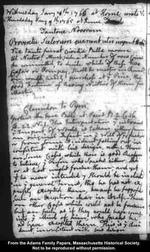
WEDNESDAY JANY. 8TH. 1766.
At Home. Wrote &c.
THURDSDAY JANY. 9TH. 1765 [i.e. 1766]
At Home. [illegible]
Tantone Novorum
Proventu Scelerum quaerunt uter imperet Urbi?
Vix tanti fuerat Civilia Bella movere
Ut Neuter.
Must such a Number of new Crimes be committed, to decide which of these two, Caesar or Pompey, shall be master in Rome? One would hardly purchase at that Price, the good Fortune of having Neither of them for Master.
Clarendon to Pym.
Grotius De jure Belli et Pacis B. 2 C. 16. . 22. N. 1. The Interpretation that restrains the Import of Words is taken either from an original Defect in the Will of the Speaker or from some Accident falling out inconsistent with his design. Note. 1. There are some Cases, which there is good Reason to believe, the Person who speaks either did or at least might foresee them; and yet that he never intended they should be included in the general Terms, tho he has not expressly excepted them, because he supposed such an Exception clear in itself. There are other Cases which could not be foreseen but are such as if they could have come into the Mind of him who speaks, he would have excepted them. This is the Accident, inconsistent with his design.
Page 13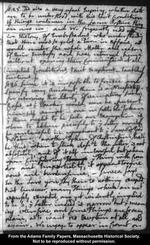
. 25. Tis also a very usual Inquiry, whether Acts are to be understood, with this tacit Condition if things continue in the same Posture they are now in: and We frequently read of in History, of Embassadors, who understanding that there was so great a Turn in Affairs, as would render the whole Matter and reason of their Embassy void, have returned home without opening their Commission at all. (implied Conditions, tacit Exceptions, tacit Restrictions.)
. 26. Since it is impossible to foresee and specify every Accident, there is a Necessity for reserving the Liberty of exempting such Cases, as the Speaker would, were he present
him self, exempt. One infallible Token that there ought to be such an Exemption is, when to adhere precisely to the Letter would be unlawful i.e. repugnant to the Laws of God and Nature. Another Token of Restriction shall be this, when to stick close to the Letter, is not absolutely, and of it self unlawful, but when upon Considering
thingsthe Thing with Candor and Impartiality, it appears too grievous and burdensome. Seneca says, In the Law you say there is nothing excepted. But however, many Things which are not expressly excepted, are yet evidently implied to be so. The Letter indeed is narrow but the meaning extensive, and some Things are so very plain, as to want no Exception at all. And again, We engage to appear in Court on
Page 14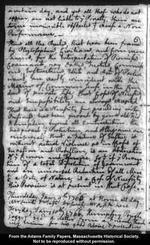
a certain day, and yet all those who do not appear, are not liable to the Penalty. There are some invincible Obstacles that excuse a Non Performance.
Thus all the Rules, that have been framed by Phylosophers, Civilians, and Common Lawyers, for the Interpretation of Promises, Covenants, nay Oaths, Treaties, Commissions, Instructions, Edicts and Acts of Parliament, are exactly coincident with the Maxim of Common sense, in the Conduct of private Life, that Cases of Necessity and Impossibility are always excepted. That there is a Necessity for proceeding with Business, has been proved by your old Friend Hampden, beyond all Contradiction. He has proved that Protection and Allegiance are reciprocal, that a Failure of justice without actual Violence as in Cases of Invasion and Rebellion, is an Abdication of the Crown and Throne. So that if the Prevention of a total Dissolution of Government and an universal Reduction of all Men to a state of Nature, is a Case of Necessity, this Province is at present in that Case.
THURDSDAY. JANY. 9TH. 1766.
At Home all day. Mr. Smith, Dr. Tufts, Dr. Savil, Mr. Bass &c. here.
FRYDAY. JANY. 10TH. 1766.
Humphry Ploughjogger received a Letter from a Friend, thanking him for his good Advice and presenting
Page 15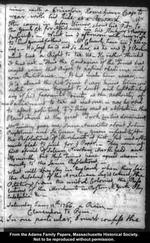
him with a Crimson, Homespun Cap to wear with his Hide, as a Reward. -- Mr. Etter came in before Dinner, about his Petition to the General Court for Assistance in his stocking Weaving Business. -- Went in the afternoon with my Wife to her Grandfathers. -- Mr. Cleverly here in the Evening. He says he is not so clear as he was that the Parliament has a Right to tax Us. He rather thinks it has not. Thus the Contagion of the Times has caught even that Bigot to passive Obedience and non Resistance. It has made him waver. It is almost the first Time I ever knew him converted or even brought to doubt and hesitate about any of his
favourite Points, as the Authority of Parliament to tax us was one. Nay he used to assert possitively, that the King was as absolute in the Plantations as the great Turk in his dominions.
Mr. Quincy gave me, some Anecdotes about John Boylstone and Jo. Green &c. Green refused to sign the Resolutions of Merchants at first, but was afterwards glad to send for the Paper. They were at first afraid of Salem, Newbury, Marblehead and Plymouth, but these Towns have agreed unanimously to the same Resolutions.
What will they say in England, when they see the Resolves of the American Legislatures, the Petitions from the united Colonies, the Resolutions of the Merchants in Boston, N. York, Phyladelphia &c.
SATURDAY JANY. 11TH. 1766.
A Rain.
Clarendon to Pym.
In one particular, I must confess the
Page 16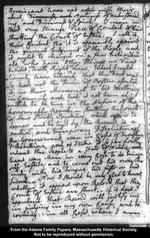
Americans have not acted with their usual
Firmness and Acuteness of Understanding, and Firmness of Spirit. I mean in that very strange Piece of Conduct of their shutting the Courts of Justice. I call it their Conduct,
tho it is apparently against the general judgment of the People, and it ought to be charged on a few Individuals, who have Other Things in View besides Truth, Right, or Law. Indeed I could scarcely have believed, that the Fact was so, had not the Town of Boston asserted it, in their Memorial to his Excellency in Council, and had it not been admitted to be true, in the Answer of the
honourable Board. Shutting the Courts of Law strictly speaking, which is to appear and be
tryed by the Records, is a partial and temporary Dissolution of the Government, even in Cases of Invasion and Rebellion, and as I take it so far forth reduces the People to a state of Nature, and leaves every Man in every Case to do
him self justice, and to carve out his own Remedy with his Tongue, his fist or his Sword. Now, I should be very glad to know, whether it appears upon Record, that the Courts of Justice are shut. If it does, I apprehend that Record will justify me in judging in my own Cause, and becoming in all Cases where I am
Page 17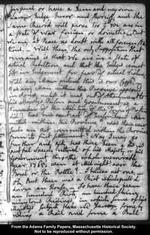
injured or have a Demand, my own Lawyer, judge, juror and sherriff. And the same Record will prove too that we are in a state of War foreign or domestic. But We are at Peace no doubt with all foreign Nations. Well then, the only Supposition that remains is that We are in a state of actual Rebellion, and that the judges cannot sit in judgment for fear of actual Violence. Will any Man pretend this is our Case? Has any Man within the Province appeared in Arms, unless it was out of Attachment to his Majestys Person and Government, as a Number of the Militia of the Town of Boston did? Has one overt act of Treason been committed within the Province? Was there ever such an Act committed within the Province from its first settlement? Nay, I may go further and ask, has there been a disrespectful Speech uttered of his Majesty or his Government,
thro the whole memorable Year 1765, even at Midnight? over the Bowl or the Bottle? -- I believe not one. -- Oh, But there was a Riot which
pull'd down an House. -- So have there been an hundred Riots, an hundred skimmingtons Ridings, in which some of his Majestys subjects have received Damage, some by riding a Rail and some a Bull,
Page 18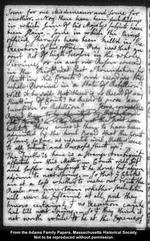
some for one Misdemeanor and some for another. Nay there have been such Ridings in which some of his Majestys subjects have been slain, some in which the Kings officers, sherriffs have been killed in the Execution of his office. Pray was that an overt Act of high Treason in the whole Province, or in any one Person concerned in the Riot? Was that a Foundation for shutting the Courts? and recording the whole Province in a state of Rebellion? Will it be said that there is no Record of any shutting of Courts? no Record to prove any Invasion or Rebellion?
[illegible] How comes it then to have been admitted by the honorable Board that the Courts of Law, so far as respected civil Matters, were to all Intents and Purposes
shutt up?
The Truth is here is a strange Ambiguity affected in this Matter. Courts will sit and suffer no Business to be done but adjourn, adjourn to next Spring. So that the Clerks are at a loss whether to make out Writs, the People are uncertain whether such Action will ever be sustained at all, and they know certainly that no Execution can be had till next Spring. So that they think it not worth while to be at the
Expence of
Page 19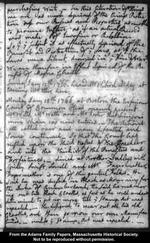
purchasing Writs. In this situation of Things we are as much deprived of the Kings Protection of our Persons and Properties, as unable to procure justice, as if an actual Record was made of Invasion or Rebellion. So that the subject is as effectually deprived of the Benefit and Protection of the Law, as if the Laws were silent, drowned in the Din of War! We are therefore in Effect deprived of the Benefit of Magna Charta.
SUNDAY JANY. 12TH. 1766.
Heard Mr. Wibird all day, at Evening Mr. Etter, here.
MONDAY JANY. 13TH. 1766.
At Boston, the Inferiour Court of Common Pleas opened. Present Mr. Wells, Mr. Watts and Mr. Foster Hutchinson. More than 100 new Entries. The Actions all called over and many defaulted and some continued. So that The Court has rushed upon the thick Bosses of the Buckler and into the thickest of the Penalties and Forfeitures. Dined at Brother Dudleys, with Gridley, Swift, Lowell and Mr. Fayerweather. Fayerweather is one of the genteel Folks. He said he was dressed in Black as Mourning for the Duke of Cumberland. He said he was wearing out his black Cloaths as fast as he could and was determined to get no more till the Stamp Act was repealed. He designed to wear out all his old Cloaths, and then go upon our own Manufactures, unless the stamp Act was repealed.
Page 20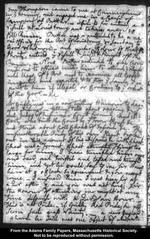
One Thompson came to me at Cunninghams in the Evening, and engaged me in a Cause of Lampson vs. Buttar, which is for entering a Vessell at Louisbourg and taking away 10 Bbls. Rum. Buttar was or pretended to be a naval Officer for the Port of Louisbourg, or Secretary to Governor Whitmore, and under Colour of that Authority, entered the Vessell and seized and brought off the Rum. Now Butter pretended to give Commissions to officers under him to attend the Wharfs and Keys of the Port and to examine all Goods imported and exported, and to stop the same, and report to him if illegal, or Contrary to the orders of the Governor, &c.
Mr. Gridly was in a very trifling
Humour to day after Dinner, telling tales about Overing &c. and judges of
Inferiour Courts formerly, and McCarty who built the Court by the Town House &c., and Stories about
Coll. Choate of Ipswich, &c. The unsmotherable Pride of his own Heart, broke out in his account of his Disputes &c. with Choat. Choat was a Tyrant, Choat attempted Things too large for him. I have tumbled him over and over, and twisted and tossed and tumbled him, and Yet he could say to me sir I was here at 9 o Clock by Agreement and you was not come. -- I answered him I was here, sir, at a Quarter after 9, and you was not here. Sir the
Honour of attending me might at any Time dispense with a Quarter of an Hour. -- This is not Pride. If Gridley had Pride, he would scorn such gross Vanity. A new England Church he said was one Object of Dispute
Page 21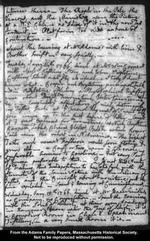
between them. -- The People in the Pale, the Deacons, and the Minister were the Picture of a N.E. Church. No Idea of it in the new Testament. Platform too was a bone of Contention.
Spent the Evening at Mr. Adams's, with him and Brother Swift, very socially.
TUESDAY JANY. 14TH. 1766.
Dined at Mr. William Coopers with Messrs. Cushing, Story, and John Boylstone. Cushing, silent and sly as usual. Story I dont know what. Cooper and Boylstone principal Talkers. Boylstone, affecting a Phylosophical Indifference about Dress, Furniture, Entertainments &c., laughed at the affectation of nicely distinguishing Tastes, such as the several Degrees of Sweet till you come up to the first degree of bitter, laughed at the great Expences for Furniture, as Nick Boylstones Carpetts, Tables, Chairs, Glasses, Beds &c. which Cooper said were the richest in N. America. -- The highest Taste and newest Fashion, would soon flatten and grow old. -- A Curse or two upon the Climate, preferable however to Carolina. But every Part of Europe preferable to this. -- [Query]. Is not this Nicety of Feeling, this Indisposition to be satisfyed with the Climate, of the same Nature with the Delicacy of Tastes, and the Curiosity about Furniture just before exploded. -- Spent the Evening at Cunninghams.
WEDNESDAY. JANY. 15TH. 1766.
Dined at Mr. Isaac Smiths. No Company, no Conversation. Spent the Evening with the Sons of Liberty, at their own Apartment in Hanover Square, near the Tree of Liberty. It is a Compting Room in Chase & Speakmans Distillery. A very small Room it is.
Page 22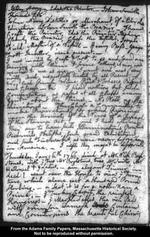
John Avery -- Eads the Printer. John Smith, Thomas [illegible]
John Avery Distiller or Merchant, of a liberal Education, John Smith the Brazier, Thomas Crafts the Painter, Edes the Printer, Stephen Cleverly the Brazier, Chase the Distiller, Joseph Field Master of a Vessell, Henry Bass, George Trott jeweller, were present.
I was invited by Crafts and Trott, to go and spend an Evening with them and some others, Avery was mentioned to me as one. I went, and was very civilly and respectfully treated, by all Present. We had Punch, Wine, Pipes and Tobacco, Bisquit and Cheese -- &c. I heard nothing but such Conversation as passes at all Clubbs among Gentlemen about the Times. No Plotts, no Machinations. They Chose a Committee to make Preparations for grand Rejoicings upon the Arrival of the News of a Repeal of the Stamp Act, and I heard afterwards they are to have such Illuminations, Bonfires, Piramids, Obelisks, such grand Exhibitions, and such Fireworks, as were never before seen in America. -- I wish they mayn't be disappointed.
THURDSDAY. JANY. 16TH. 1766.
Dined at Mr. Nick Boylstones, with the two Mr. Boylstones, two Mr. Smiths,
Mr. Hallowel and the Ladies. An elegant Dinner indeed! Went over the House to view the Furniture, which alone cost a thousand Pounds sterling. A Seat it is for a
noble Man, a Prince. The Turkey Carpets, the painted Hangings, the Marble Tables, the rich Beds with crimson Damask
[illegible] Curtains and Counterpins, the beautiful
Chimny
Page 23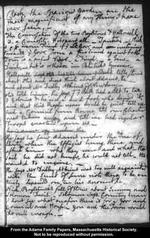
Clock, the Spacious Garden, are the most magnificent of
any Thing I have ever seen.
The Conversation of the two Boylstones and Hallowell is a Curiosity. Hotspurs all. -- Tantivi. -- Nick. is a warm Friend of the Lieutenant Governor, and [illegible] inclining towards the Governor. Tom a firebrand against both. Tom is a perfect Viper -- a Fiend -- a Jew -- a Devil -- but is orthodox in Politicks however. Hallowell tells stories about Otis and drops Hints about Adams, &c., and about Mr. Dudley Atkins of Newbury. Otis told him, he says, that the Parliament had a Right to tax the Colonies and he was a d--d fool who deny'd it, and that this People never would be quiet till we had a Council from Home, till our Charter was taken away, and till we had regular Troops quartered upon Us.
He came up under the He says he saw Adams under the Tree of Liberty, when the Effigies hung there and asked him who they were and what. He said he did not know, he could not tell. He wanted to enquire.
He says Mr. Dudley Atkins was too well acquainted with the Secret of some riots there, to be entirely depended on, in his Account, &c.
Nick Boylstone is full of Stories about jemmy and Solomon Davis. Solomon says, Country man I dont see what Occasion there is for a Governor and Council and House. You and the Town would do well enough.
Page 24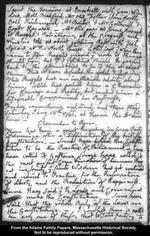
Spent the Evening at Bracketts with Gen. Winslow,Coll. Bradford, Mr. Otis, Father Danforth,Coll. Richmond, Mr. [Brinlys?], and Mr. [Caldwell?] and Captain Hayward. Mr. Otis gave Us some Account of Ruggles's Behaviour, at the Congress, and Winslow told Us about catching Bass with Eeel Spears, at the North River. Otis says, that when they came to sign Ruggles moved that none of them should sign, but that the Petitions should be carried back to the assemblies, to see if they would adopt them. This would have defeated the whole Enterprize. This Ruggles has an inflexible Oddity about him, which has gained him a Character for Courage and Probity, but renders him a disagreable Companion in Business.
FRYDAY [17 JANUARY].
Came home, and dined, and there stayed.
SATURDAY. JANY. 18TH. 1766.
At Home. The Dr. dined here.
Clarendon to Pym.
There has been a great Inquiry, in some Parts of America, after a
Diffinition of the british Constitution. Some have defined the Constitution to be the Practice of Parliament. Some have called it, Custom, some have
call'd it the most perfect Combination of human Powers in society, that finite Wisdom has yet contrived and reduced to Practice, for the Preservation of Liberty, and the Production of Happiness. Some Have said that
[King], Lords, and Commons make the Constitution. Some have said that the whole Body of the Laws are the Constitution. -- I confess there is nothing in any one of these, that is satisfactory to
Page 25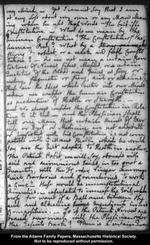
my Mind. Yet I cannot say that I am at any Loss about my own or any Man's Meaning when he uses those Words "The british Constitution."
What do we mean by the human Constitution? The Constitution of the human Body? What by a
strong or a weak strong and robust, or a weak and feeble Constitution? Do we not mean a certain Contexture of Nerves,
fibres, Muscles, or certain Qualities of the Blood and juices, as sizy or watery,
flegmatic or fiery, acid or alkaline? These are the Ideas which enter into our Minds when we consider the human Constitution as productive of Health or Strength. And We always consider the Constitution in Relation to its End. And the Physician shall tell one Man, that certain Kinds of Exercise, or
Dyet or Medicine are not adapted to or consistent with his Constitution, i.e. not compatible with that Mans Health, which he would say are the best adapted to Health in another. The Patients Habit, we will say, abounds with acid and acrimonious juices, in too great a Quantity, will the Dr. order Vinegar,
Lemmen Juice, Barberries and
Cramberries, to work a Cure? These would be unconstitutional Remedies, calculated to increase the Evil, which arose for want of a
Ballance between the acid and Alkaline
juices Ingredients in his Composition. So if the Patients Nerves are braced overmuch, will the Physician order the Jesuits Bark? There is a certain Quan
[Quanity]
Page 26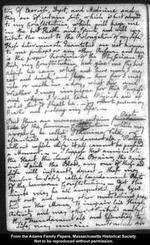
tity of Exercise,
Dyet, and Medicine, and they are of certain Sorts, which is best adapted to my Constitution, which will keep me in the best Health and Spirits, and will contribute the most to the Prolongation of my Life. These determinate Quantities are not known to me perhaps or any other Person. And here is the proper Province of the Physician, to study my Constitution, and give me the best
Advise he can, what and how much I may eat and drink, and sleep, how far I may ride or walk in a day, what Air and Weather I may improve for this Purpose and when I shall take
Physick and of what sort it shall be, in order to preserve my Health and prolong my Life.
But there are moreover certain
[illegible] Parts of the human Constitution which may properly be called Stamina Vitx, or essentials and Fundamentals -- Parts without which Life itself cannot be preserved a Moment. I suppose that annihilate the Heart, the Lungs, the Brain, the Animal Spirits, the Blood, any one of these and Life will instantly depart. These may therefore be safely called fundamental Parts of the human Constitution. Yet the Limbs may be all amputated, the Eyes put out, and many other mutilations practiced on the Man, to impair his Strength, Activity and many other Attributes and yet the Fundamentals and Essentials to Life, may remain untouched and
Page 27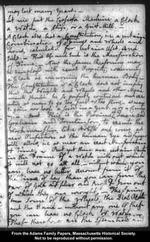
may last many Years.
Let me put the Case of a Machine, a Clock, a Watch, a Ship, or a Grist Mill.
A Clock also has a Constitution, i.e. a certain Combination of
Weights, Springs, Wheels and Levers, calculated for certain Uses and Ends. This Use and End is the Mensuration of Time. Now the same Reasoning may be employed with equal Propriety, concerning a Clock as concerning the human Body. The Constitution of a Clock does not imply that the Weights and Wheels and other Movements should be so perfectly contrived and executed as never to go too fast or too slow, as never to gain nor
loose a Second in a Year, or a Century.
But This is the Province
of Quare and Graham and Tomlinson, to execute the Workmanship like Artists and come as near Perfection as the human Eye and finger will allow, i.e. as near an exact Mensuration of Time. But yet there are certain Parts in the Frame of a Watch without which it will not go
att all -- without which you can have no better Account from it of the Time of day than you can from the
oar of Gold and silver and Brass and Iron out of which they are wrought. The Spring,
[illegible] some of the Wheels, the Dial Plate and the Hand -- without any one of these you can have no Clock or Watch. These therefore are the Essentials and
Page 28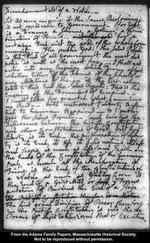
Fundamentals of a Watch.
Let Us now enquire if the same Reasoning is not applicable to Government. For Government is a Frame, a scheme, a system, a Combination of Powers, [illegible] for a certain End vizt. the good of the whole Community. The public Good, the salus Populi is the professed End of all Government, the most despotic as well as the most free. I shall not enter into any Inquiry which Form of Government, whether Either of the Forms of the schools or any Mixture of them is the best calculated to this End the Salus Populi: This is the Inquiry of the Founders of Empires. I shall take for granted what I am sure no Briton will controvert, that Liberty is essential to human Happiness -- to the public Good, the Salus Populi. And here lies the Difference between the british Constitution and other Constitutions of Government, vizt. that Liberty is its End -- the preservation of Liberty is its End, its Use, its Designation, its Drift and scope, as much as Life and Health are the Ends of the Constitution of the human Body, as much as the Mensuration of Time is the End of the Constitution of a Watch, as much as Grinding Corn is the End of a Grist Mill, or [illegible] the Transportation of Burdens the End of a Ship.
The British Constitution therefore is a Mixture
The first grand Division of Power therefore in the British Constitution is into the Power of Legislation and that of Execution.
Page 29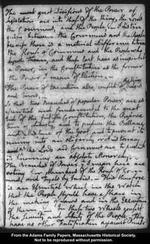
The
most great Divisions of the Power of Legislation are into those of the King, the Lords, the Commons, and the People. I distinguish between the Commons and the People because there is a material Difference between the House of Commons and the People who depute them, and these last have as important a Power, in the Constitution as the former, the Power I mean of Election.
The Power of Execution also, consists of the King, judges and jurors.
So that two Branches of popular Power, are as essential and fundamental to the great End of the british Constitution, the Preservation of Liberty, and to preserve the Ballance and Mixture of the Government, and to prevent its running into an Oligarchy or Aristocracy, and as the Lords and Commons are to prevent its becoming an absolute Monarchy.
The Branches of Power that I mean here are voting for Members of the House of Commons, and
Tryals by juries. This therefore is an Essential Wheel in the Watch, that the People should have a share in the making of Laws and in the Execution of them. In these two Wheels consist the security and Liberty of the People. They have no other Fortification against Power
Page 30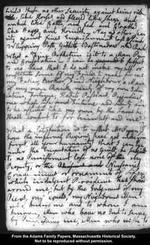
besides these, no other security against being ridden
[illegible] like Horses, and fleeced like Sheep, and worked like Cattle, and fed and
Cloathed like
Hoggs, and Hounds. Nay no other security against fines, Imprisonments, loss of Limbs, Whipping Posts, Gibbetts, Bastinadoes and Racks.
What a Fine Reflection is it to a Man, Pym, and Consolation -- I can be [illegible] subject to no Law that I do not make my self or constitute some of my Friends to make for me. My Father, Brother, Friend,Neighbour, a Man of my own Rank, nearly of my own Education, Fortune, Habits, Passions, Prejudices, one whose Life and Fortune and Liberty are to be affected like my own, by the Laws he shall consent to for himself and me!
What a Satisfaction is
[it] to reflect, Mr. Pym, (I hope the infernal Regions have not made you forget all your humanity) that I can
lye under the Imputation of no Guilt, be subject to no Punishment, lose none of my Property, or the
Pleasures and Necessaries, Conveniences or Ornaments of Life which indulgent Providence has showered around me, but by the judgment of my Peers, my equals, my
Neighbours, Men who know me and to whom I am known, Men who have no End to serve by Punishing me, Men who wish to
Page 31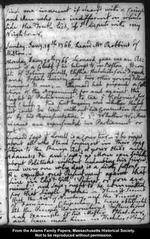
find me innocent if charged with a Crime and Men who are indifferent on which Side the Truth lies, if I dispute with my
Neighbour.
SUNDAY. JANY. 19TH. 1766.
Heard Mr. Robbins of Milton.
MONDAY. JANY 20TH. 1766.
Leonard gave me an Account of a Clubb that he belongs to, in Boston. It consists of John Lowell, Elisha Hutchinson, Frank Dana, Josiah Quincy, and two other young Fellows, Strangers to me. Leonard had prepared a Collection of the Arguments, for and against the Right of Parliament to tax the Colonies, for said Clubb. His first Inquiry was whether the subject could be taxed without his Consent in Person or by his Representative? 2d. Whether We Americans are represented in Parliament or not?
Leonard says that Lowell is a Courtier, that he
ripps about all who stand foremost in their opposition to the Stamp Act, at your Otis's and Adams's &c. and says that no Man can scribble about
Politicks without bedaubing his fingers, and every one who does is a dirty fellow. He expresses great Resentment against that Line in Edes & Gill, "Retreat or you are ruined," and says they ought to be committed for that single stroke. -- Thus it seems that the Air of Newbury, and the Vicinage of
Farnham,
Chipman &c. have obliterated all the Precepts, Admonitions, Instructions and Example of his Master Thatcher, and have made him in Thatchers Phrase
Page 32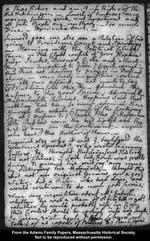
a shoe licker and an A--se Kisser of Elisha Hutchinson. Lowel is however very warm, sudden, quick, and impetuous and all such People are unsteady. Too much Fire. Experientia docet.
Leonard gave me also a Relation of his going to Providence Court and Spending an Evening with the Political Clubb there. The Clubb consists of Governor Hopkins, Judge Jenks, Downer, Cole and others. They were impatient to have the Courts opened in this Province not choosing to proceed in Business alone. Were very inquisitive concerning all our Affairs. Had much to say of Hutchinson, Otis, &c. Admired the answer to the Governors Speech. Admired the Massachusetts Resolves. Hopkins said that nothing had been so much admired there through the whole Course of the Controversy, as the Answer to the Speech, tho the Massachusetts Resolves were the best digested and the best of any on the Continent. Enquired who was the Author of them.
Enquired also who it was that burlesqued the Governors Speeches? Who wrote jemmybullero, &c. Thought Hutchinsons History did not shine. Said his House was pulled down, to prevent his writing any more by destroying his Materials. Thought Otis was not an original Genius, nor a good Writer, but a Person who had done, and would continue to do much good service.
Were very inquisitive about McIntosh. Whether he was a Man of Abilities, or not? Whether he would probably rise, in Case this Contest should be carried into any Length. Jo. Green, Waterhouse and Church were talk'd of as capable of Bullero and the Burlesques.
End-paper
End-paper
Inside Back Cover
Back Cover, upside down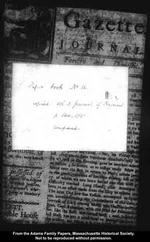
Paper book no. 12.
copied. Vol 3 [i.e. 2]. Journal of Fragments
p 144-175
compared.
[The preceding text was added in the handwriting of Charles Francis Adams]

































